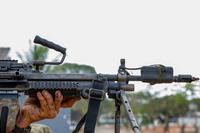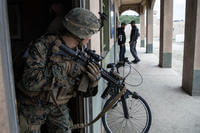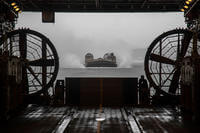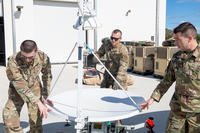Chief of Naval Operations Adm. Gary Roughead has signed off on the Navy’s “Vision for Confronting Irregular Challenges.” The Navy will buy ships and aircraft that provide “broadened” and “balanced” capabilities to deal with a range of irregular opponents, including pirates, terrorists, criminal organizations, insurgents and other state and non-state actors, the document says.
By “balancing shifts in our investments” the service will better address and incorporate “urgent and emerging requirements” to confront the “hybrid nature” of future challenges. It emphasizes buying “multi-mission ships and aircraft,” oriented to “lower end operations,” such as Littoral Combat Ship mission modules, Riverine squadrons and “persistent manned and unmanned surveillance platforms.” Navy undersecretary Bob Work has been a big proponent of building flexibility and multi-mission capabilities, his “big boxes” concept, into ship design.
The document calls for using conventional weapons in low end missions, “to include P-3 for surveillance against terrorists and insurgents, tactical aircraft for armed reconnaissance, and submarines and surface combatants in counter-drug operations.” Navy ships and personnel currently provide anti-terrorist forces in the Philippines, pirate hunters off East Africa, protection of oil platforms in the Arabian Gulf and foreign nation security force training and assistance with multi-mission amphibious ships and helicopters.
The irregular warfare vision advocates closer ties with the Coast Guard and the Marines, as well as other government agencies and non-government organizations. Expanding coordination with interagency and international partners features prominently in the new vision document as part of the “indirect” approach to supporting counterterrorism, counterinsurgency and foreign internal defense. “Partners can appreciate the Navy’s dependable but impermanent presence, which requires neither a footprint ashore nor infringement on their sovereignty.”
The open seas and littoral areas provide “operating space” for irregular actors to destabilize weak governments, traffic in contraband or intimidate populations. As part of the Navy’s Cooperative Strategy, the vision “recognizes the value presence, of being there,” to maintain security and gather intelligence as well as to act as a deterrent to non-state actors.







